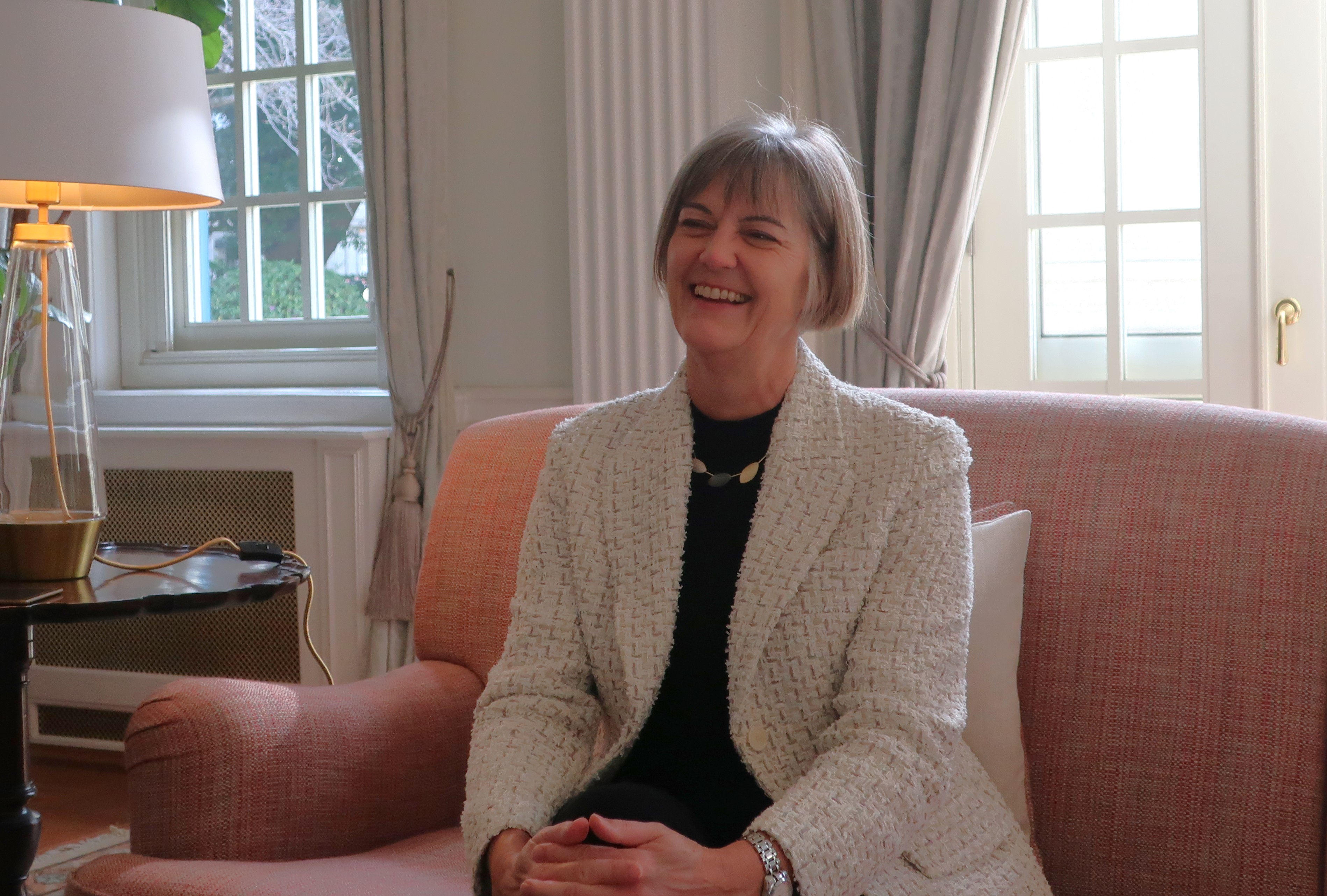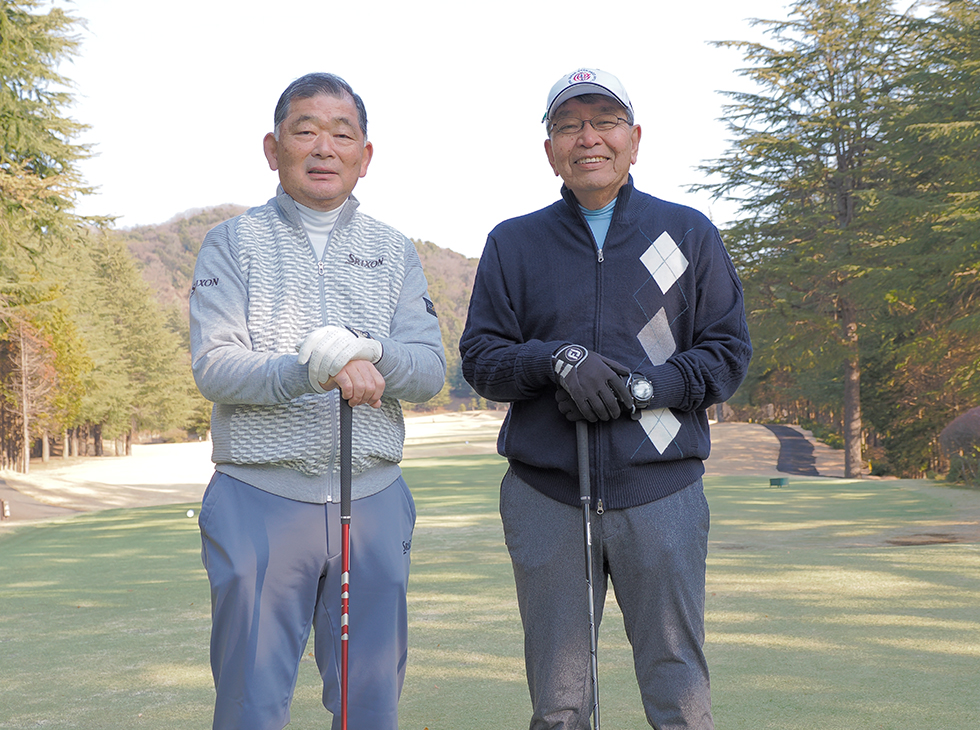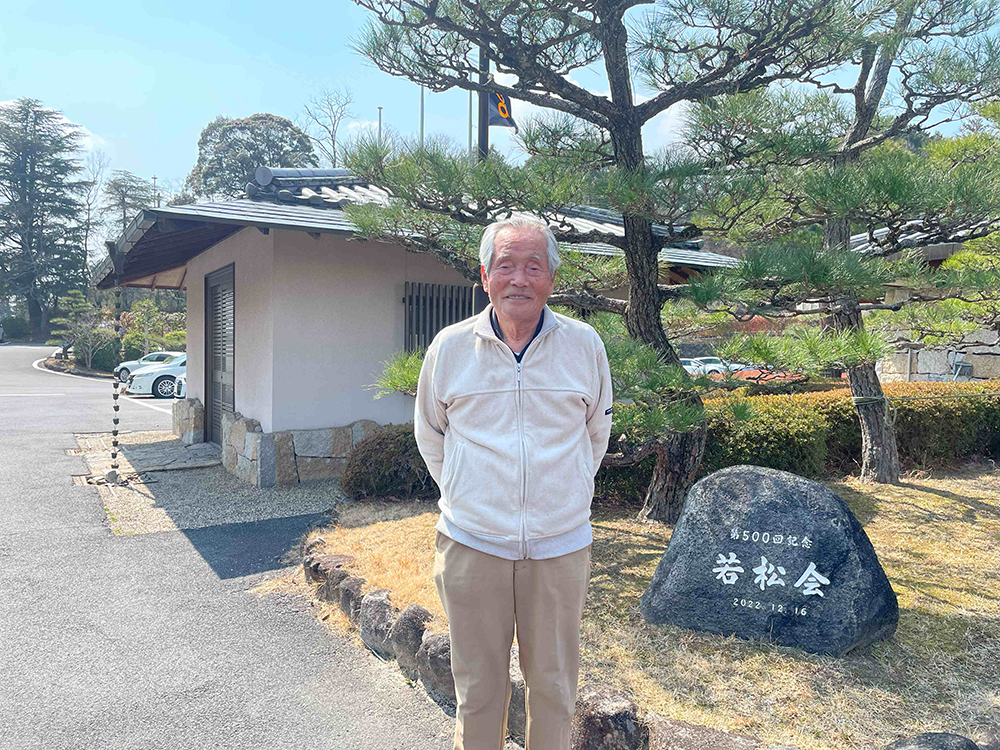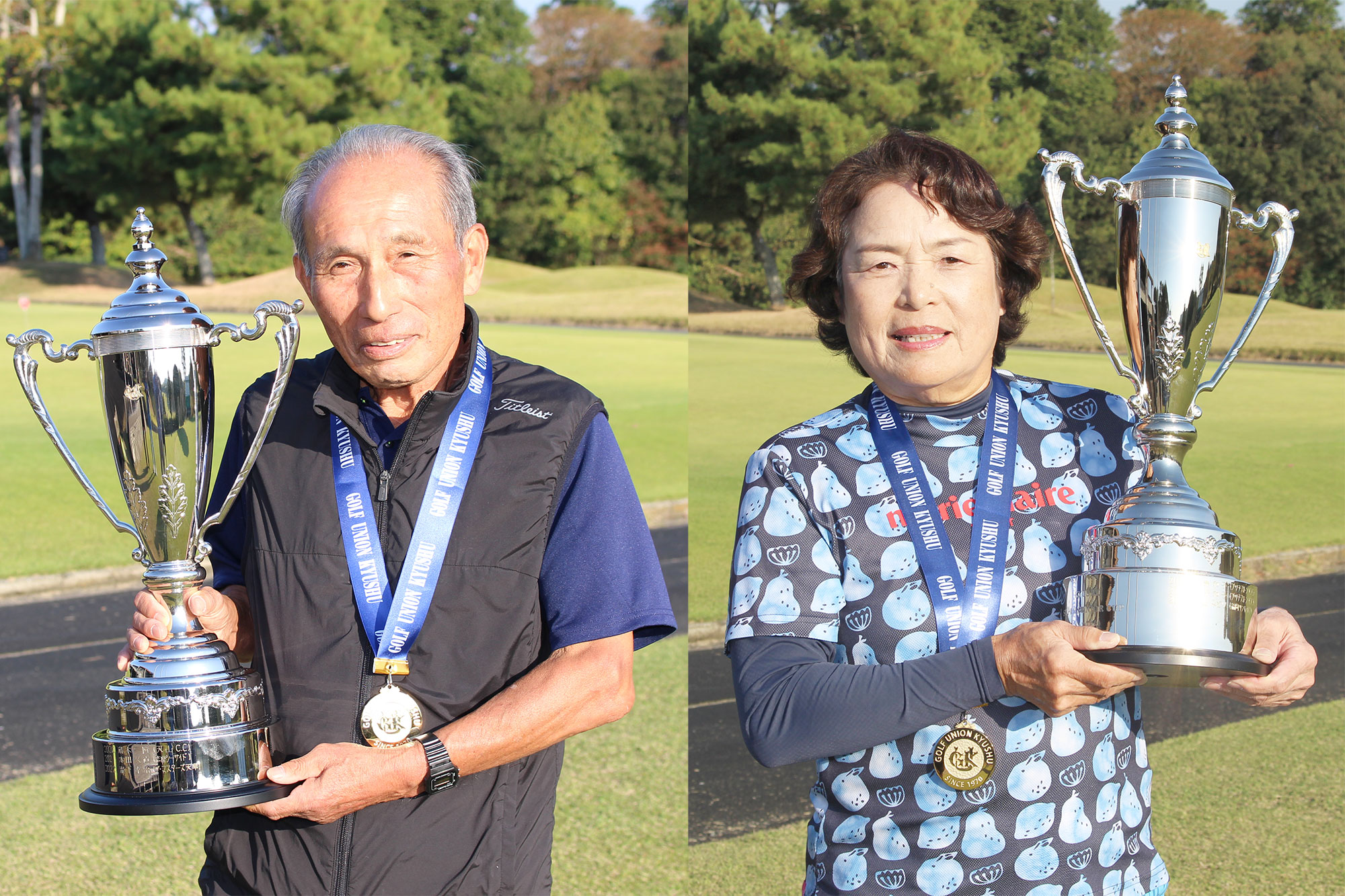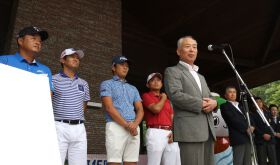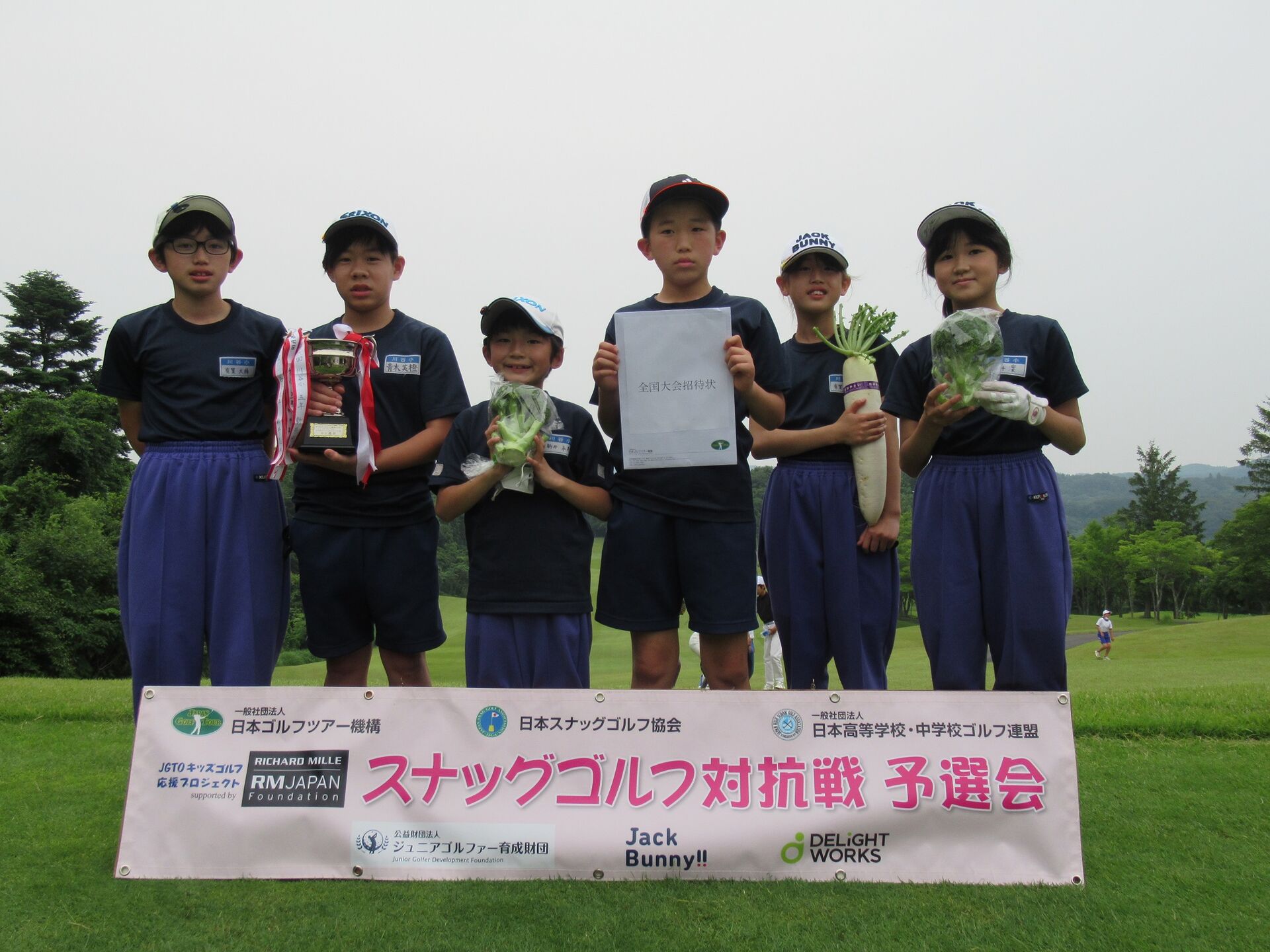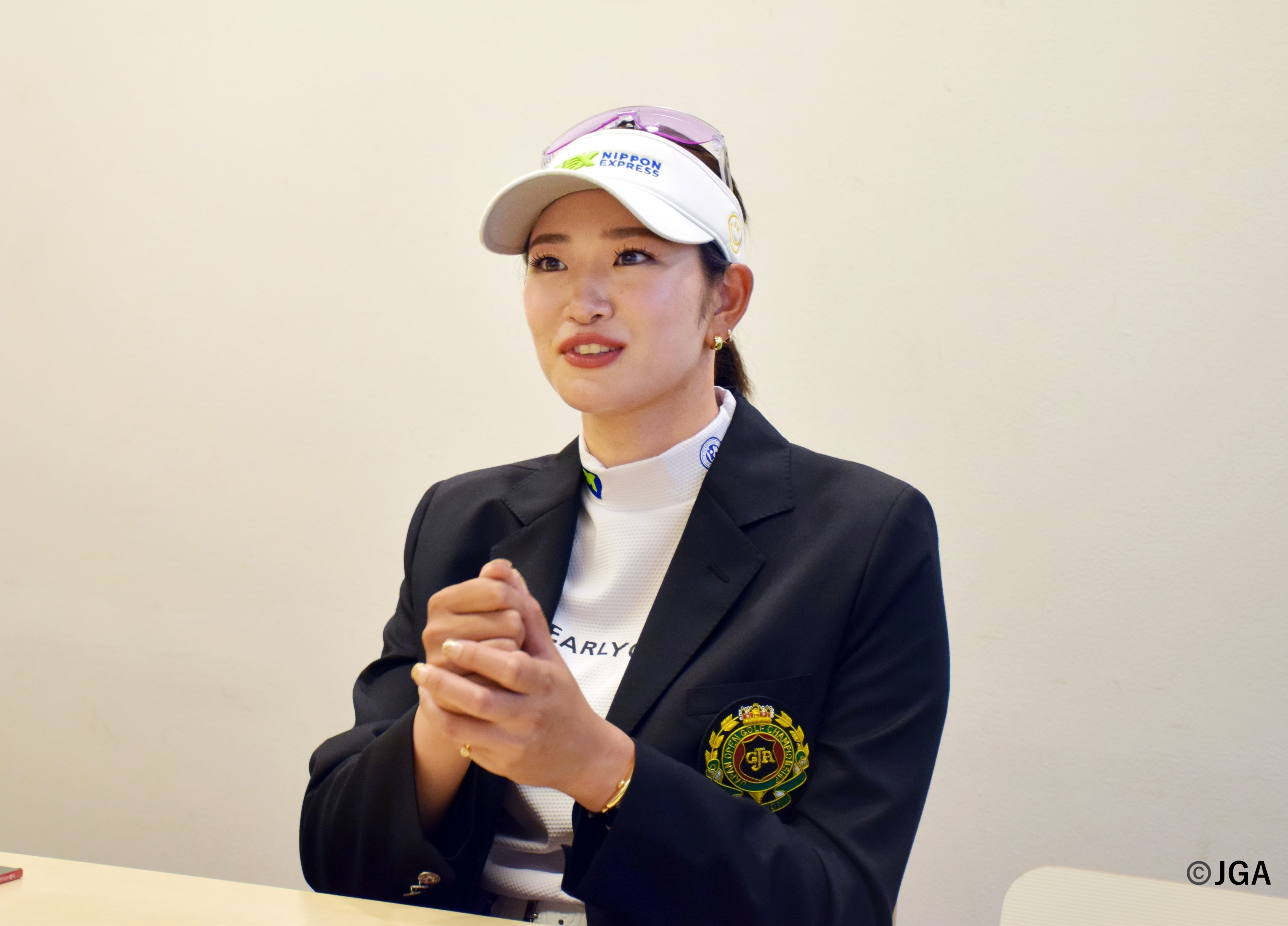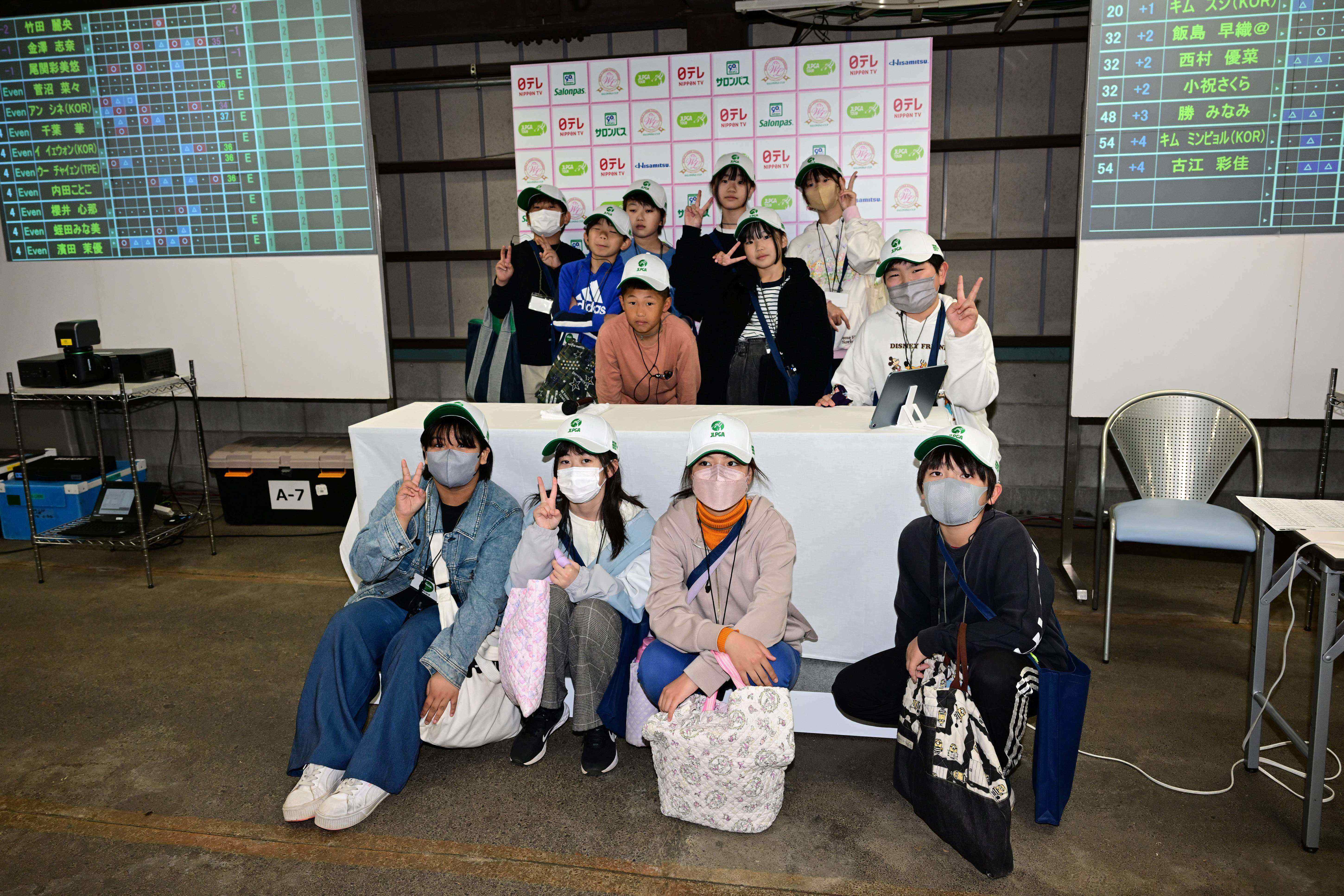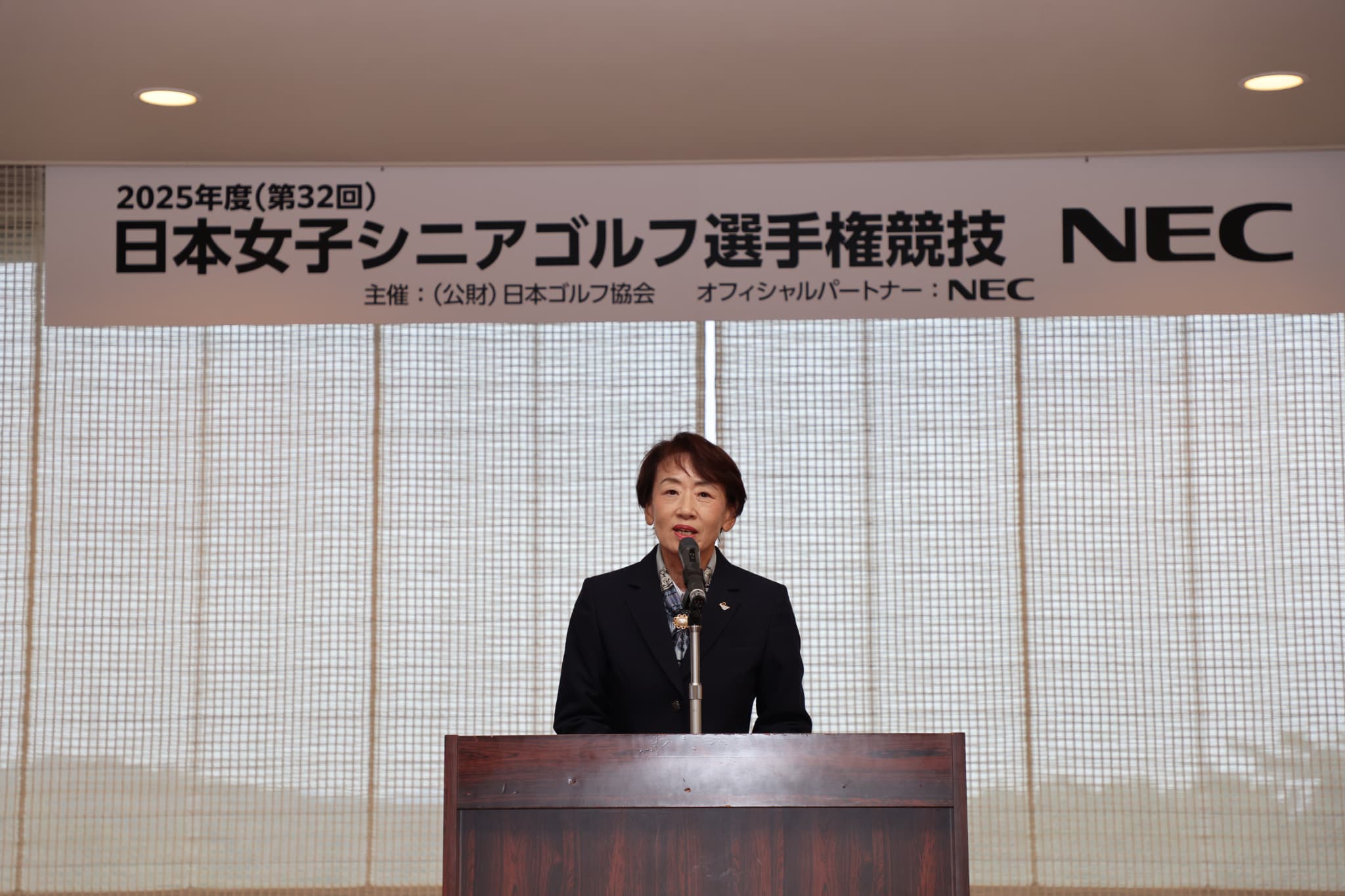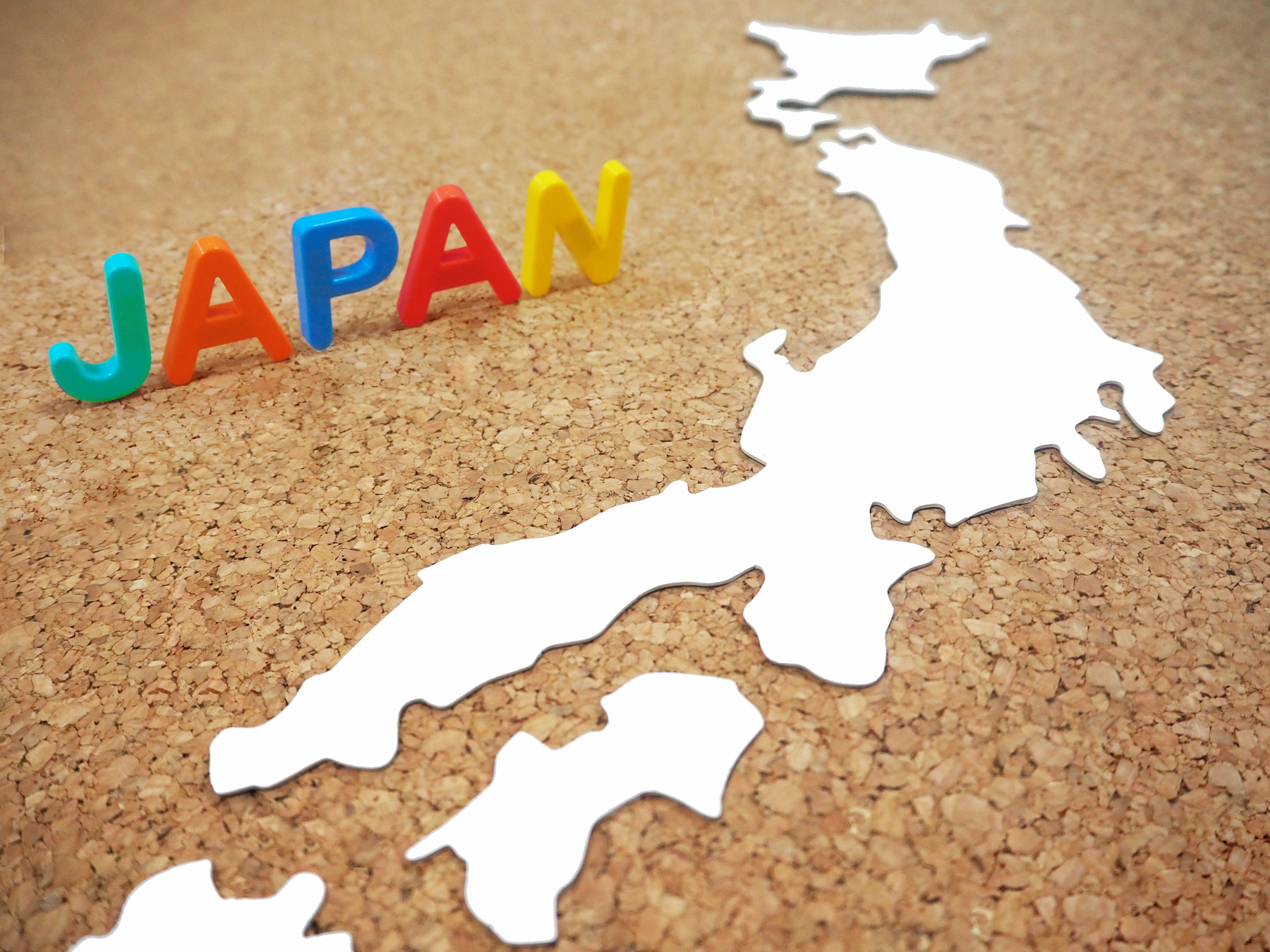ゴルフ発祥の地とされる英国は、ゴルフ場は2,660コースを数え、米国に次ぎ世界2位(日本は約2,200コースで3位)。イングランド、スコットランド、ウェールズ、北アイルランドの各地で、老若男女がプレーをする姿が目に付く。JGAは2019年にゴルフの「総本山」でもあるR&Aの「女性のゴルフ振興憲章」に署名し、女性のゴルフ人口を約15%から20%に高めることを目指している。ゴルフの歴史と伝統が社会に根付いている英国のジュリア・ロングボトム駐日大使にお話を伺った。
――外交官として日本に3度目の赴任となる大使は、ゴルフ、テニスなどスポーツ好きとお聞きしています。
最初は1990年から4年間日本に駐在、次は2012年からまた4年間、そして21年から大使として日本にいます。その間、オランダ・ハーグ、ポーランド・ワルシャワに赴任し、アジアでは北朝鮮、モンゴルを含むほとんどの国を訪問しました。学生時代からいろんなスポーツをしてきましたが、メインはテニスでした。母がやっていて、兄、妹と私は友人とテニスクラブでレッスンを受けたり試合をしたり多くの時間をテニスに使っていました。水泳、ランニング、フィールドホッケーのほか、バスケットボールのようなチームスポーツであるネットボールも好きでしたね。ゴルフを始めたのは23歳くらいのときで、両親がポルトガルに1週間のゴルフ休暇に連れて行ってくれたのがきっかけです。
子供ができてフルタイムで働くようになると、ゴルフはあまりできなくなりました。でも、駐日大使として日本に戻ってきた今は、ゴルフにはまっています。といっても月1回くらいですが。私はあまり上手くないけれど、夫がそれなりにゴルフができるので一緒にラウンドに行き、他の方々とプレーを楽しんでいます。程ヶ谷カントリー倶楽部や東京ゴルフ倶楽部のようなゴルフ場でプレーできるのは光栄なことですし、仕事を通じて知り合った人たちと会うには最高の環境だと思いますね。ビジネスのためだけでなく、人間関係を深めるためにも、人の違った面を知るのはとてもいいことです。軽井沢や日光、蓼科などでもプレーしました。程ヶ谷カントリー倶楽部から富士山が見えたり桜や紅葉を眺めたり、自然のなかでスポーツや社交を楽しみ、新鮮な空気を吸うのは本当に気持ちがいい。ただ、たいていスル―プレーの英国と違って日本はランチを挟んでほぼ一日がかり。英国は日が長い夏場だと夜の9時や10時までプレーが可能だから仕事が終わってからでも18ホールあるいはハーフラウンドできます。また日本の人は雨が降るとキャンセルすることが多いですね。英国で雨が降るたびにキャンセルしていたら、いつになってもプレーできません(笑)
――英国には女性大使は何人くらいいるのでしょうか?
23年時点で大使の43%が女性と、18年の約23%から大きく変わっています。組織として、『あなたには可能性がある。あなたは成功者になれる。あなたの学習と成長をサポートする』と女性に伝えることを長年にわたり行ってきたからです。現在、カナダやオーストラリア、トルコなど多くの国に女性大使がいます。日本には他の国の女性大使が20~23人ほどいて、オンライン・ネットワークや集まりを通じて連絡を取り合っています。
――日本では公職や企業の中で女性の管理職や役員の数が少なく、比率を上げるよう勧告されていますが、日本での女性の地位をどのようにご覧になっていますか?また改善策などについてお考えはありますか?
30年以上前に私がキャリアをスタートさせたとき、英国では既に女性に対してあらゆる機会がありました。今の日本の社会も30年~35年前の英国と同じで地盤が整い、法律が整備され、理論的には機会平等になっていますが、まだ変わる必要があると感じます。より多くの女性が昇進し上級職に就くことで、男性と全く同じチャンスがあるということが常態化する必要があります。日本には優秀で素晴らしい女性がたくさんいます。社会全体にとって正しい解決策を導き出すためには、女性が指導的役割を果たす必要があると感じています。日本でも変化が起き、現代の若い人たちはお互いをもっと対等な存在として見ていると思いますが、人々の考え方が変わるには長い時間がかかります。もっと多くの優秀な女性が、社会全体を代表するような上級職に就いてほしいと思っています。英国でのゴルフには、かつて男性専用のゴルフクラブという伝統がありましたが、現在は大半のクラブが男女平等な条件で会員になることができます。
――大使が初めて日本に着任されてから30年余り。日本の文化や社会の変化をどう受け止めていますか?
90年代は好景気の影響で、日本の人々がスキーやゴルフ、旅行など『クオリティー・オブ・ライフ』に注目していたのを覚えています。ただ30年間の経済停滞は、特に若者にとってかなり厳しいものになり、普通の家庭では留学して英語を学んだり、勉強したりすることが少なくなった気がします。だから、私たちは日本の若者を励まして、日本の外の世界を勉強し、スポーツの楽しさ、他の人々との社会的なつながりなど人生のさまざまな側面について考えるよう、もっと努力する必要があります。同時に日本でも戸籍制度やLGBTの権利などについて、政治や社会で多くの議論が交わされ、日本社会はより多様化していると思います。
――普段の生活でのちょっとした楽しみは?日本の文化でお好きなものはありますか?
時折、千鳥ヶ淵から日本武道館あたりをジョギングしますが、ほんの15~20分も走れば、街の真ん中に素晴らしい景色が広がるんです。皇居の庭園や石垣を眺め、美しい松の木や青い空を見るのは好きですね。夏の暑さはちょっと苦手ですが、春の桜やつつじ、秋の紅葉も美しいですね。あちこち行きましたが、お気に入りの一つは高野山(和歌山)です。たくさんの塔頭寺院がある美しい仏教都市で宿坊に泊まって素晴らしい雰囲気を楽しめました。中山道をハイキングし、昔ながらの旅館(宿坊)に泊まるのも魅力的でした。また広島も印象的で、温かくてフレンドリーな街だと思います。日本ではどんなお寺や神社に入っても美しいものを楽しめます。芸術では現代美術が好きですが、歌舞伎も見たし、今後は能などもっと日本の自然や文化に触れる経験をしたいと思っています。
ゴルフはチャレンジングで、脳を活性化させる。
――日本では若者たちのゴルフ人口が減っていますが、女性やこれからゴルフを始める人へメッセージをお願いします。
私はたくさんの人にいろいろなスポーツに挑戦することを勧めています。身体的にも精神的にも健康に良く、社会的なつながりを生み出すためにとても価値があります。ゴルフは難しいスポーツでもありますが、自分自身との競争だから、常に向上心を持って、より良くなる方法を見つけようとするもの。私にとって、ゴルフは飽きることのないスポーツだと感じています。なにより、屋外で仲間と一緒に時間を過ごし、脳を活性化させ、鋭敏に保つには本当にいいスポーツだと思います。
スポーツは私の人生にとってとても価値のあるものです。人前でパフォーマンスすることで自分の感情をコントロールしたり精神的な面を意識することもでき、多くの貴重な経験も得られます。私の3人の子どもはみんなスポーツ好きで、長女はクリケットの英国チーム代表の選手です。私の家族にとってスポーツは常に生活の大きな部分を占めているんです。ゴルフは難しいけど、常に希望をもってプレーができると思います。一度、すごくいいショットを打てば、なんでもうまくいくのではと思います。私の場合、ミスショットが多いですが、これからはもっと定期的にプレーして上達したいと思っています。パワー、飛距離がそれほどなくても正確さを磨き、パットのタッチなどショートゲームを向上させれば上手くなれるのがゴルフのいいところだと思うので、これからが楽しみですね。
構成・吉良幸雄(情報シェアリング部会委員)
―――――――――――――――――――――――――――――――――――――――――――――――――――――――――――――――――――
Sports and Golf have the power to connect people. Looking forward to seeing more women’s social advancement in Japan in the future.
The United Kingdom, considered the birthplace of golf, has some 2,660 golf courses, ranking second in the world after the United States (Japan ranks third with approximately 2,200 courses). Across England, Scotland, Wales and Northern Ireland, men and women of all ages can be seen playing golf. In 2019, the JGA signed up to the Women in Golf Charter, promoted by the R&A, which is the HQ of global golf in St Andrews, aiming to increase the number of women golfers in Japan from approximately 15% to 20% of the population. We spoke with Ms. Julia Longbottom, the British Ambassador to Japan, whose home country is the origin of so much of the history and traditions of golf.
―― This is your third assignment in Japan as a diplomat, and we hear that you are a sports enthusiast, including golf and tennis.
I was first in Japan for four years, from 1990, then again from 2012 until 2016, and now as Ambassador since 2021. Between those stays in Japan, I have been posted to The Hague, Netherlands, Warsaw, Poland, and visited most countries in Asia, including North Korea and Mongolia. I have played many sports since my school days, and my main one was tennis. My mother played, and my brother, sister and I spent a lot of time at the tennis club with friends taking lessons and playing matches. I also liked swimming, running, hockey, and netball, which is a team sport like basketball. I started playing golf when I was about 23 years old, when my parents took me on a week-long golf vacation to Portugal.
Once I had children and started working full time, I was not able to play much golf. But now that I am back in Japan as Ambassador, I have become very keen on golf. I play golf about 12 times a year. I am not a very good golfer, but my husband can play very well, so we go out and play together and also with other people. It is an honour to be able to play at golf clubs like Hodogaya Country Club and Tokyo Golf Club, and I think golf offers an excellent environment to engage with people I have come to know through work. Golf is great to get to know different sides of people, not only for business, but also to deepen relationships. I have also played in Karuizawa, Nikko, and Tateshina. The view of Mt. Fuji from the Hodogaya course, seeing cherry blossoms and autumn leaves, enjoying sports and socialising in nature, and breathing fresh air is really so enjoyable. However, unlike in the UK, where a round of golf is usually played without a break, in Japan it takes almost all of the day with lunch after the first nine holes. In the summer, when the days are long, golfers in the UK can play until 9 or 10 p.m., so they can play 9 or even 18 holes after finishing work. Also, people in Japan often cancel their rounds when it rains. If we had to cancel every time it rained in the UK, you would not be able to play so often!
――How many female ambassadors does the UK have posted around the world?
As of 2023, 43% of ambassadors from the UK are women, a significant change from about 23% in 2018. As an organisation, we have been telling women, ‘You have potential. You can be successful. We support your learning and growth,’ over the years. We now have female ambassadors in many countries, including Canada, Australia, and Turkey. There are about 20-23 female ambassadors from other countries in Japan, and we keep in touch through our online network and gatherings.
――In Japan, the number of female managers and executives in public offices and companies is low, and there are recommendations to increase the ratio. What is your view of the status of women in Japan and do you have any ideas on how to improve it?
When I started my career over 30 years ago, in the UK every opportunity was already open to women. Today, Japanese society is the same as it was in the UK 30-35 years ago, with the groundwork laid, the laws in place, and theoretically equal opportunities, but I feel that there are still changes needed. It needs to become the norm that more and more women are promoted and take on senior positions and have exactly the same opportunities as their male counterparts. There are many talented and wonderful women in Japan. I feel that women need to take on leadership roles in order to come up with the right solutions for society as a whole. I believe that change is happening in Japan, and young people today see each other more as equals, but it will take a long time for everyone’s way of thinking to change. I would like to see more talented women in senior positions that represent society as a whole. In golf, there used to be a tradition of men-only golf clubs in the UK, but now the majority of clubs offer membership on equal terms to men and women.
――It has been more than 30 years since you first arrived in Japan. How do you perceive the changes in Japanese culture and society over that time?
I remember that in the 1990s, due to the booming economy, people in Japan were focusing on ‘quality of life’ such as skiing, golfing, and traveling. However, 30 years of economic stagnation has become quite tough, especially for young people, and I feel that ordinary families are less likely to study abroad and learn English. So we need to do more to encourage Japanese youth to study the world outside of Japan and to think about different aspects of life, such as the joys of sports, social connections with other people, and so on. At the same time, I think Japanese society is becoming more diverse, with much discussion in politics and society about the family registration system and LGBT rights.
――What do you enjoy in your daily life? Do you have any favorite aspects of Japanese culture?
Occasionally I jog from Chidorigafuchi to the area around the Nippon Budokan. It is only a 15-20 minute run, but I have a wonderful view in the middle of the city. I love looking at the gardens and stone walls of the Imperial Palace, the beautiful pine trees, and the blue sky. I don’t like the heat in summer, but the cherry blossoms and azaleas in spring and the autumn leaves in fall are also beautiful. I have been to many places around Japan. One favourite is Koyasan in Wakayama, a beautiful Buddhist city with many temples, and I enjoyed the wonderful atmosphere staying in a temple (shukubou) there. Hiking along the Nakasendo trail and staying in a traditional ryokan was also fascinating. Hiroshima is also a very warm and friendly city. In Japan, you can walk into any temple or shrine and enjoy the beauty. In terms of art, I like contemporary art, but I have also seen Kabuki and would like to experience more of Japanese nature and culture in the future, including Noh for example.
Golf is Challenging and exercises both your body and brain.
――In Japan, the number of young people playing golf is decreasing. Do you have any message for women or people who are just starting to play golf?
I encourage people to play all kinds of sports. It is good for your physical and mental health and very valuable for creating social connections. Golf is a challenging sport, but it is a competition with yourself, so you are always trying to improve and find ways to get better. For me, I find golf to be a sport that I never get tired of. Most of all, I think it’s a really good sport to spend time outdoors with friends and keep your brain active and sharp.
Sports are very valuable to my life. Performing in front of others helps you control your emotions and be aware of your spiritual side, and you also gain a lot of valuable experience. All of my three children play sports, and my oldest daughter is a professional cricketer. Sports have always been a big part of life for my family. Golf is difficult, but I think you can always hope for the best. I think that one time you hit a very good shot, then everything will work out. In my case, I miss a lot of shots, but I want to play more regularly to improve. I think the great thing about golf is that even if you don’t have a lot of power or distance, you can become good at it if you improve your accuracy and short game, so I am looking forward to my own golfing future.
By Yukio Kira(Member, Information Sharing Unit)

